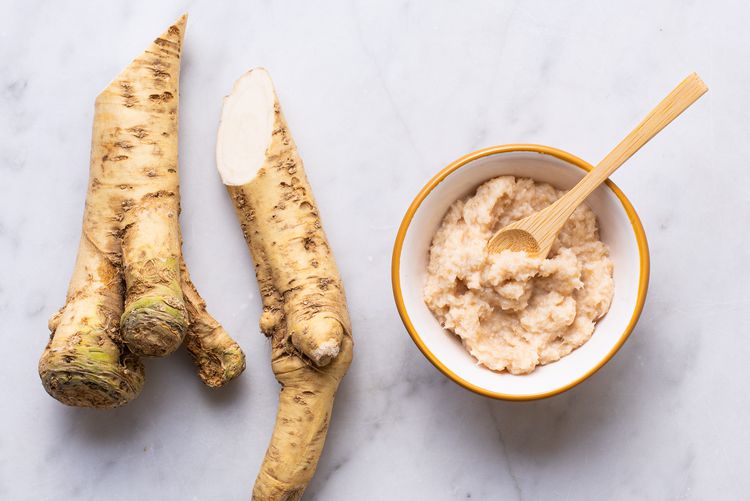Health Benefits of Horseradish
What are the health benefits of horseradish?
Horseradish is a pungent root vegetable that offers several potential health benefits due to its nutrient content and bioactive compounds. Some of the key health benefits of horseradish include:
- Rich in Nutrients: Horseradish is low in calories but rich in nutrients like fiber, vitamin C, folate, potassium, and calcium, which are important for overall health and well-being.
- Antioxidant Properties: Horseradish contains compounds like glucosinolates and isothiocyanates, which have antioxidant properties. These compounds can help protect cells from damage caused by free radicals and reduce inflammation in the body.
- Digestive Health: The fiber content in horseradish can support digestive health by promoting regular bowel movements and preventing constipation. It may also help improve gut health by acting as a prebiotic, feeding beneficial bacteria in the gut.
- Anti-Microbial Properties: Horseradish has natural antimicrobial properties due to its high sulfur content. It may help fight off harmful bacteria and other pathogens, potentially reducing the risk of infections.
- Anti-Inflammatory Effects: Some studies suggest that the compounds in horseradish may have anti-inflammatory effects, which could be beneficial for conditions like arthritis and inflammatory bowel disease (IBD) such as Crohn’s disease and ulcerative colitis.
- Potential Cancer-Fighting Properties: Some research indicates that the compounds in horseradish may have anti-cancer properties. They may help inhibit the growth of cancer cells and induce cancer cell death, though more research is needed in this area.
- Respiratory Health: Horseradish has a strong, pungent aroma that can help clear the sinuses and promote respiratory health. It is often used as a natural remedy for coughs, colds, and congestion.
- Heart Health: The potassium content in horseradish may help regulate blood pressure and support heart health. Potassium is also important for maintaining muscle function and nerve signaling.
- Weight Management: Horseradish is low in calories and fat, making it a healthy choice for weight management. It can add flavor to dishes without adding excess calories.
- Skin Health: The vitamin C and antioxidants in horseradish can help promote healthy skin by reducing oxidative stress and inflammation.
Overall, horseradish can be a flavorful addition to a healthy diet and may offer several potential health benefits. However, it is also strong and spicy, so it should be consumed in moderation, especially by individuals with sensitive stomachs or digestive issues.
What are the health risks of horseradish?
While horseradish is generally safe for most people when consumed in moderate amounts as a food, there are some potential health risks associated with its use:
- Digestive Issues: Horseradish is rich in fiber, which can be beneficial for digestion. However, consuming large amounts of horseradish may cause digestive issues such as stomach upset, gas, bloating, or diarrhea, especially in individuals with sensitive stomachs or digestive disorders like irritable bowel syndrome (IBS).
- Skin Irritation: The juice or grated root of horseradish can cause skin irritation, redness, or a burning sensation when applied topically. It is important to use caution when handling horseradish and to avoid contact with the skin, especially if you have sensitive skin or a history of skin allergies.
- Allergic Reactions: Some individuals may be allergic to horseradish, especially those with allergies to other plants in the Brassicaceae family, such as mustard, cabbage, or broccoli. Allergic reactions to horseradish can range from mild symptoms like itching and swelling to more severe reactions like difficulty breathing or anaphylaxis in rare cases.
- Interaction with Medications: Horseradish may interact with certain medications, including blood thinners like warfarin (Coumadin) and antiplatelet drugs. The high vitamin K content in horseradish can interfere with the effects of these medications, potentially increasing the risk of bleeding.
- Pregnancy and Breastfeeding: There is limited information available on the safety of horseradish during pregnancy and breastfeeding. It is recommended to avoid consuming large amounts of horseradish during these times to avoid any potential risks.
- Gastroesophageal Reflux Disease (GERD): Horseradish is a pungent and spicy food that may trigger or worsen symptoms of GERD in some individuals. It is advisable for those with GERD to consume horseradish in moderation or avoid it altogether.
- Kidney Issues: Horseradish contains oxalates, which can contribute to the formation of kidney stones in susceptible individuals. People with a history of kidney stones may need to limit their intake of high-oxalate foods like horseradish.
- Blood Pressure: Horseradish is high in potassium, which is beneficial for heart health and blood pressure regulation. However, individuals with kidney disease or those taking medications that affect potassium levels should monitor their intake of potassium-rich foods like horseradish.
Overall, while horseradish can be a flavorful addition to a healthy diet, it is important to consume it in moderation and be aware of any potential risks, especially if you have underlying health conditions or are taking medications. If you have any concerns about consuming horseradish, it is best to consult with a healthcare provider or a registered dietitian.




